Charles E W Bean, Diaries, AWM38 3DRL 606/273/1 - 1918 - 1937 - Part 10
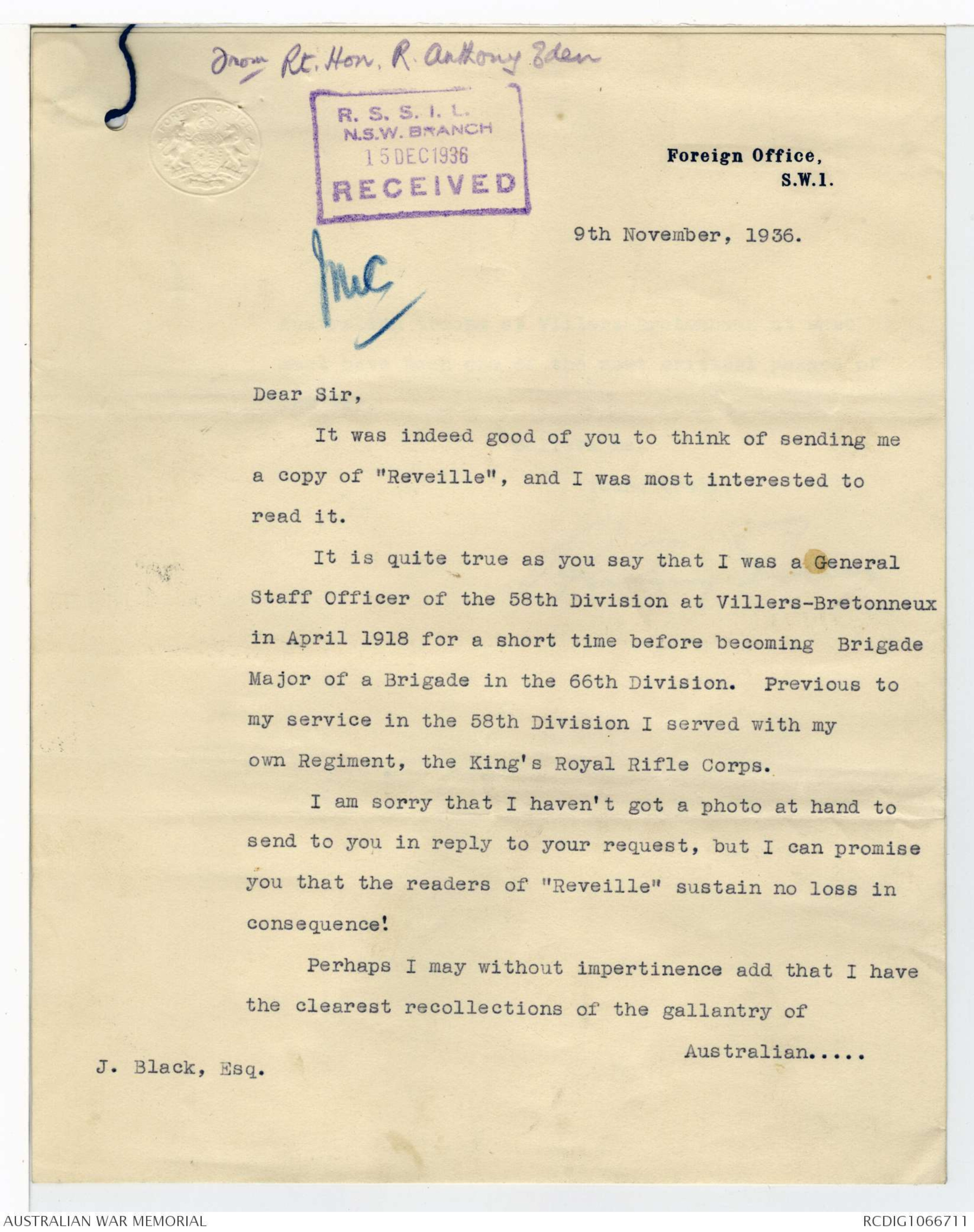
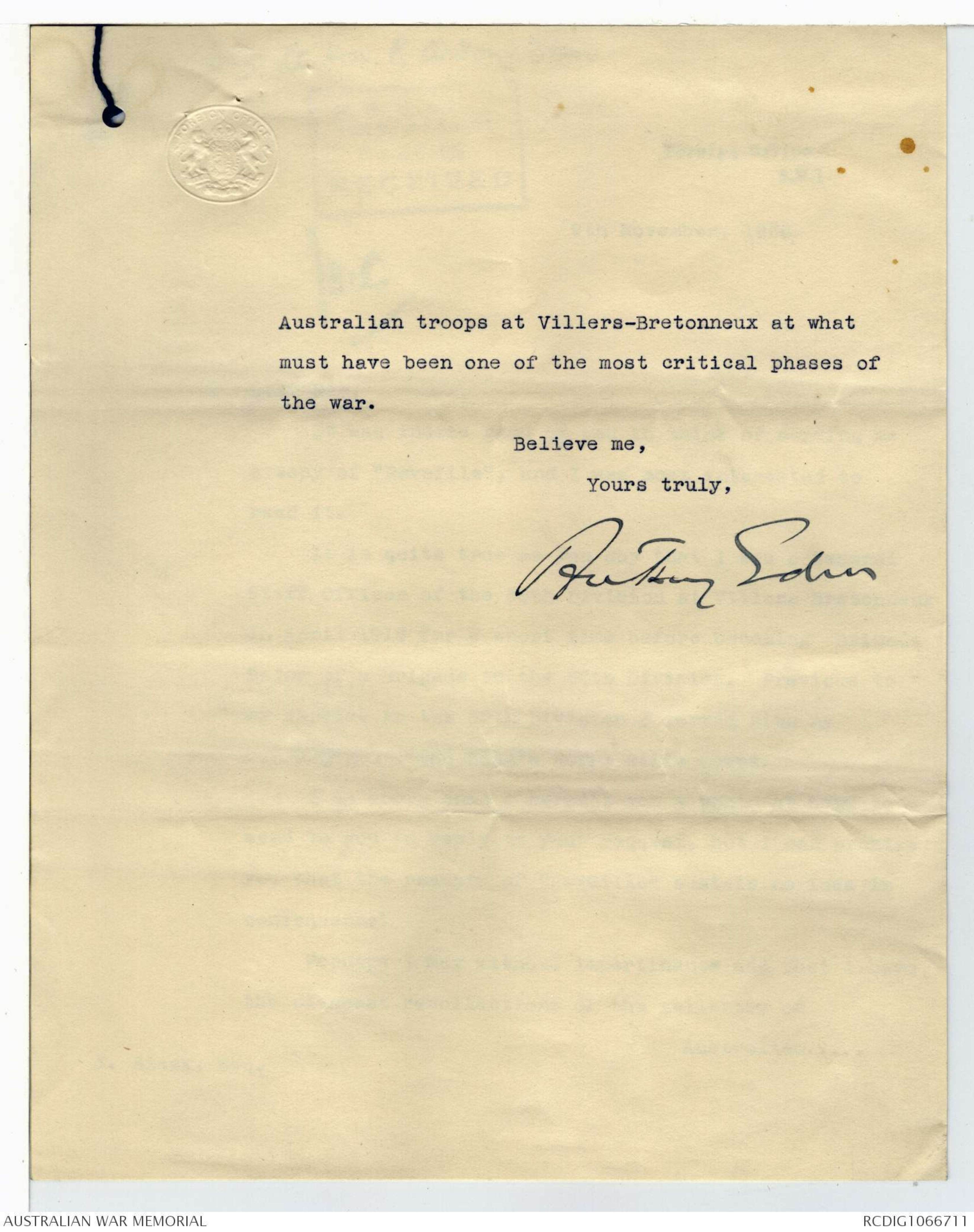
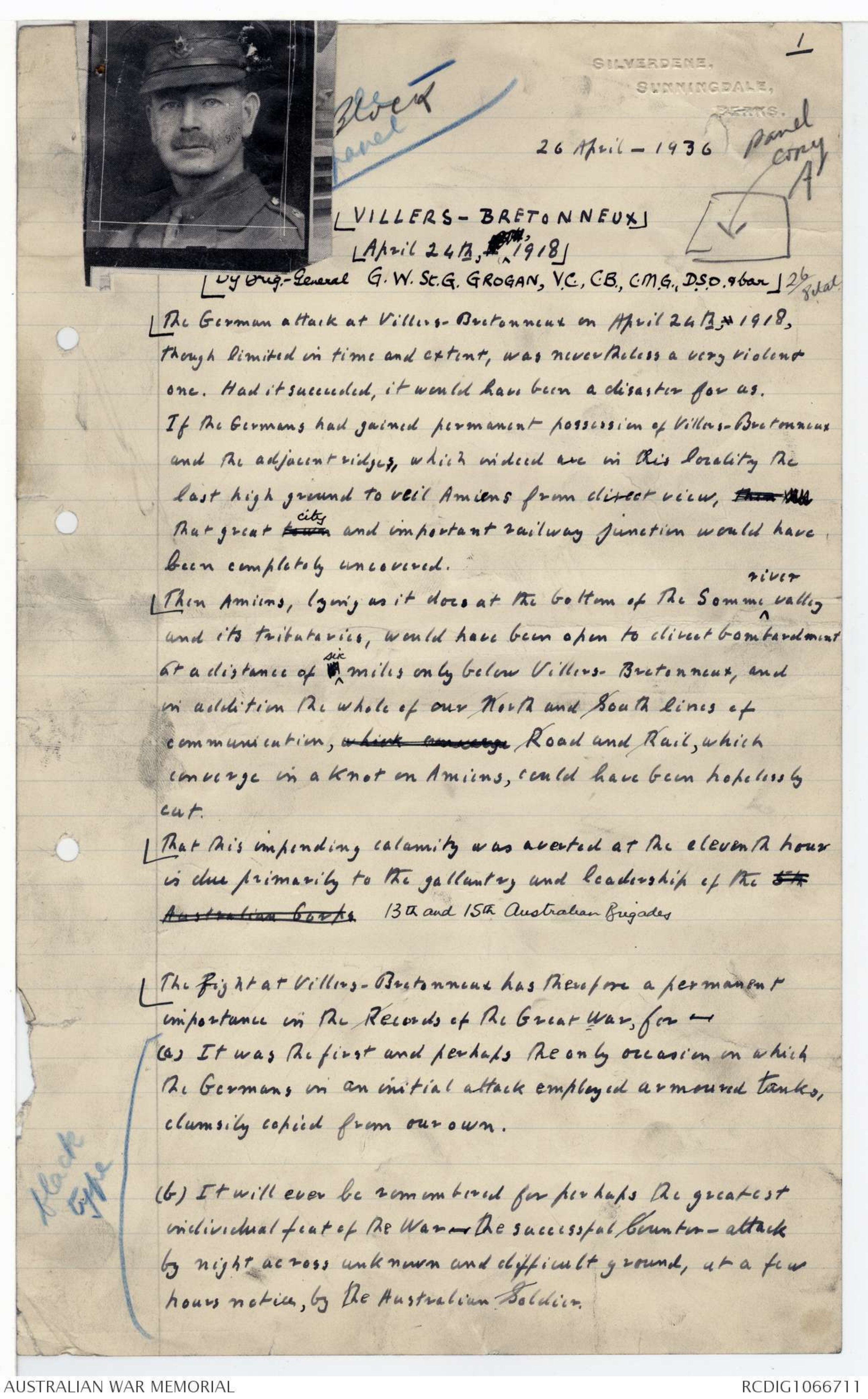
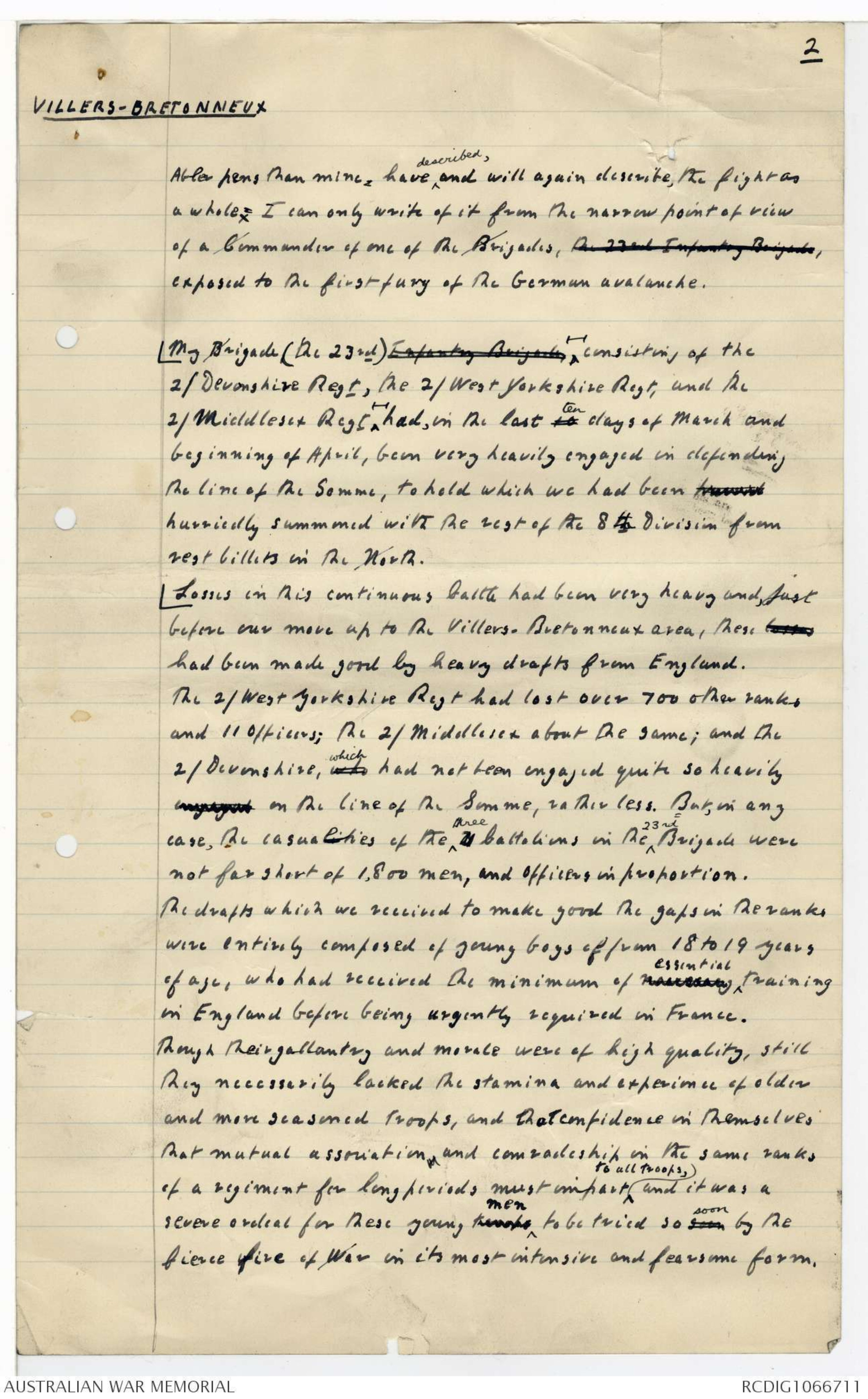
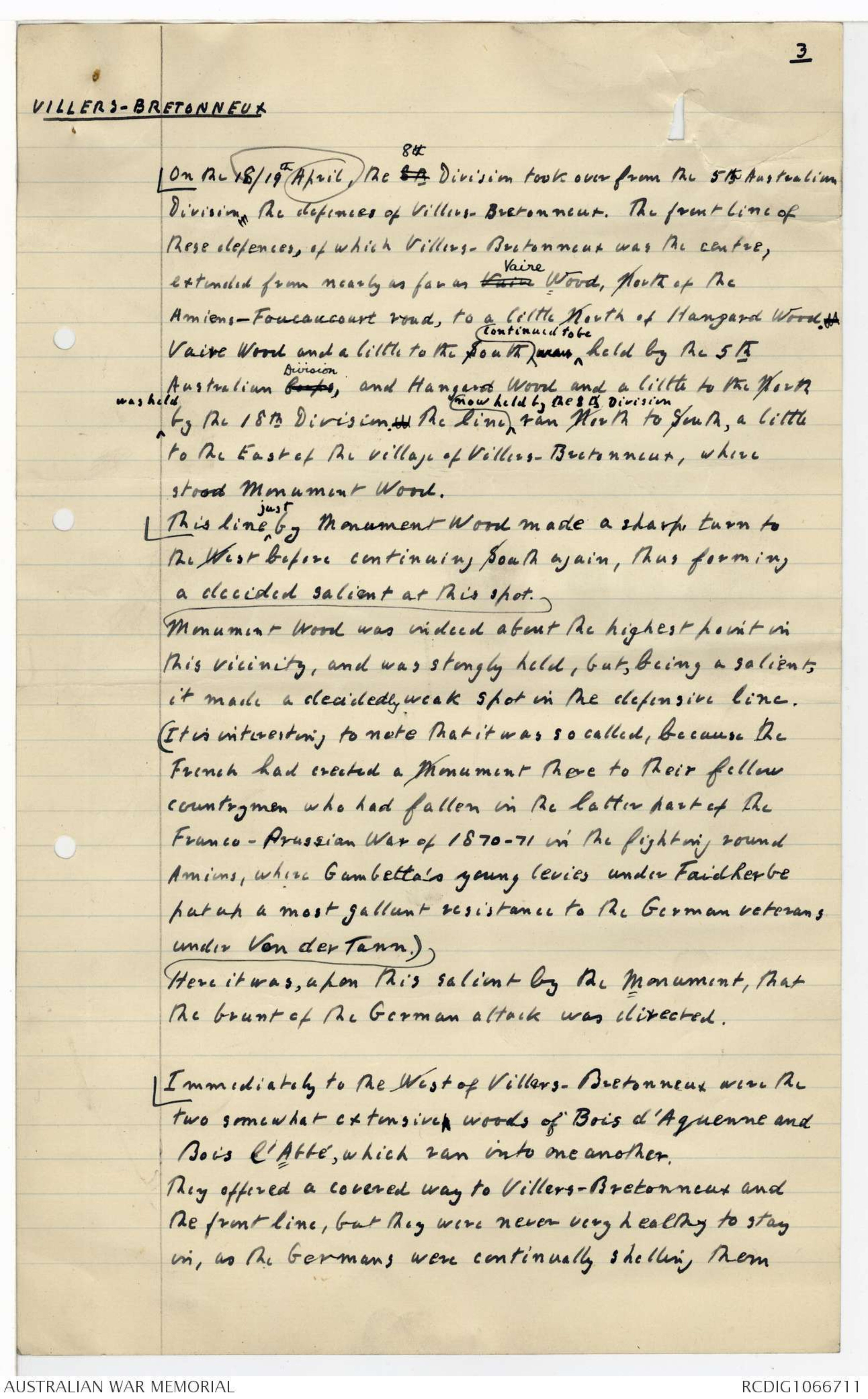
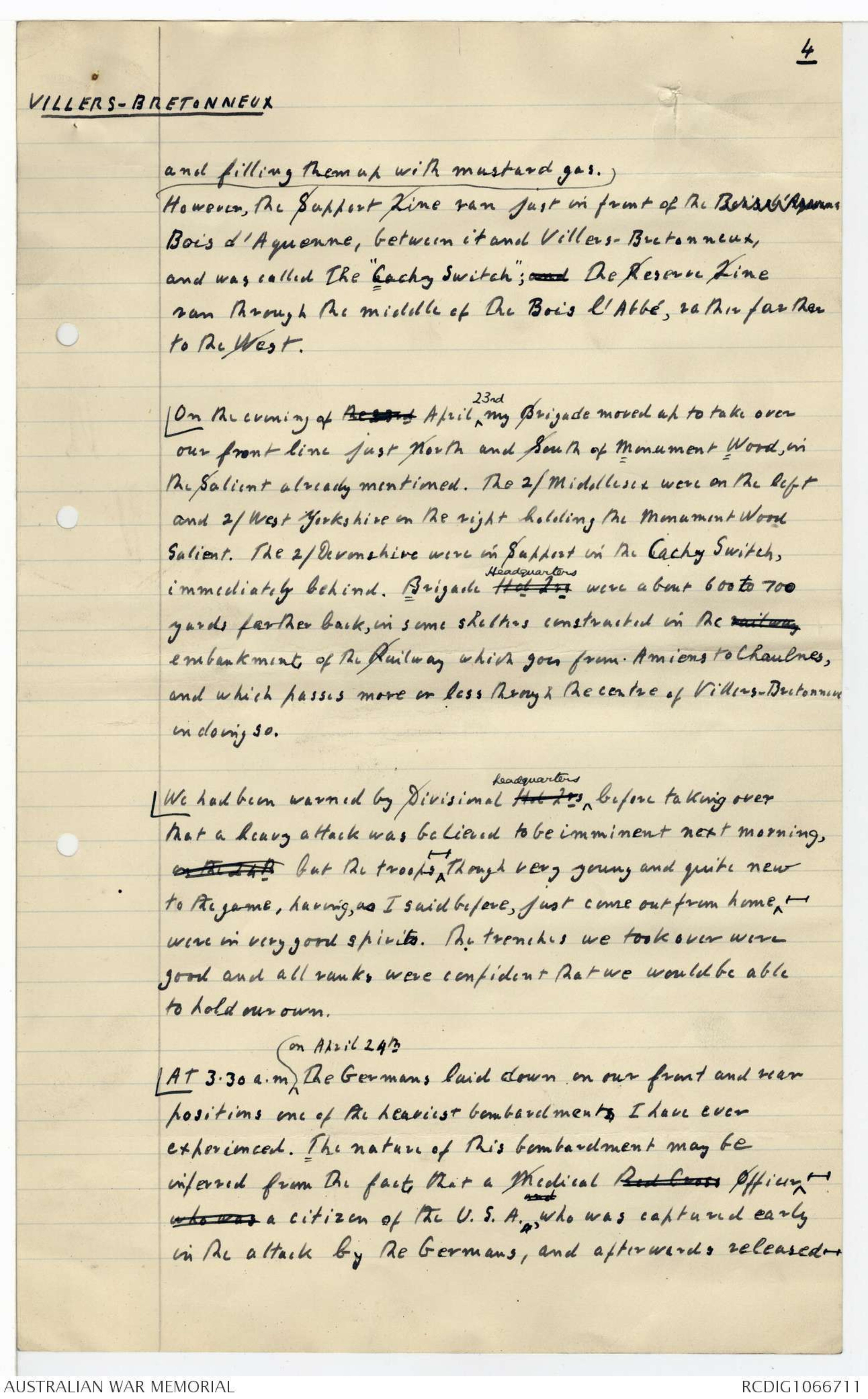
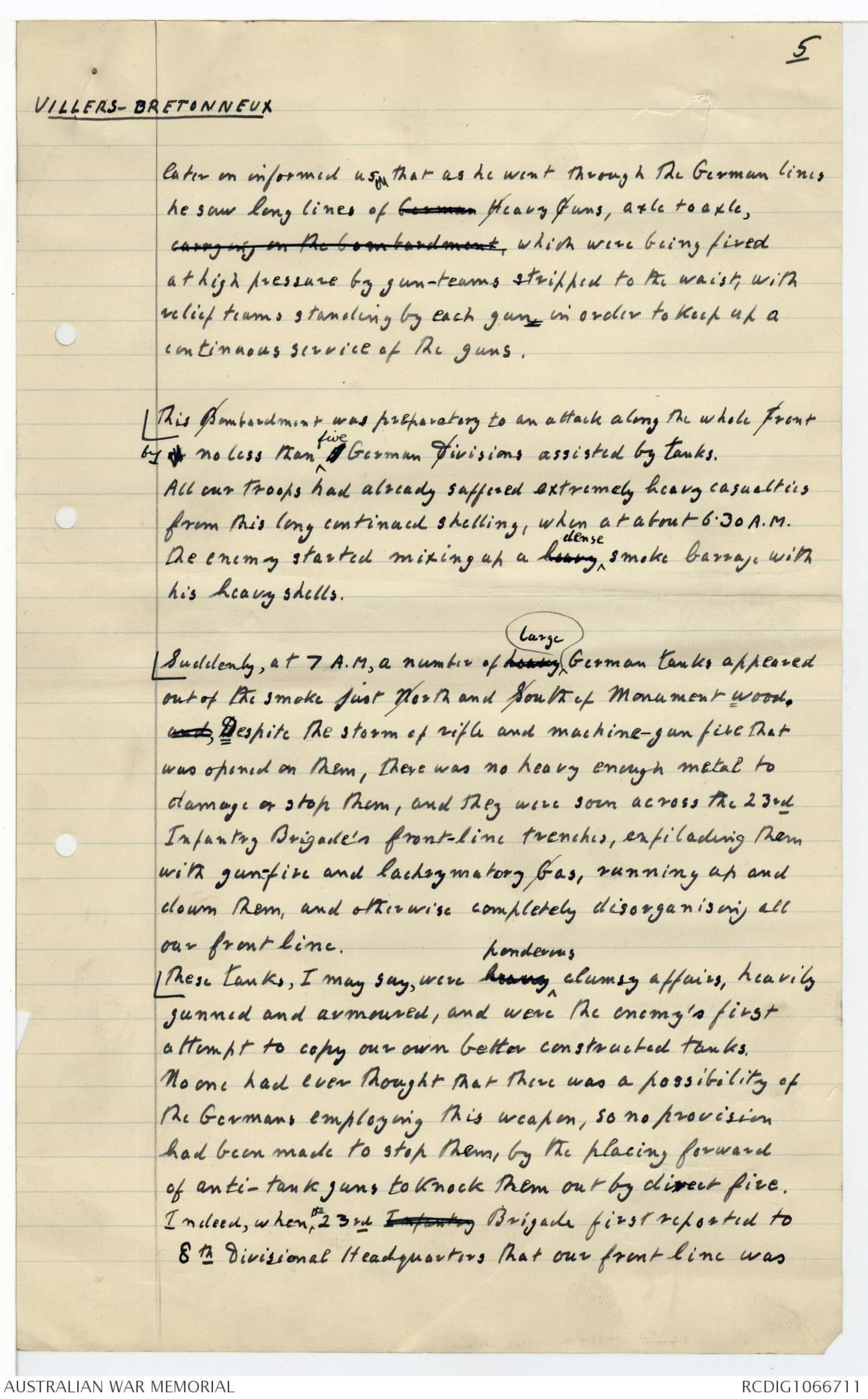
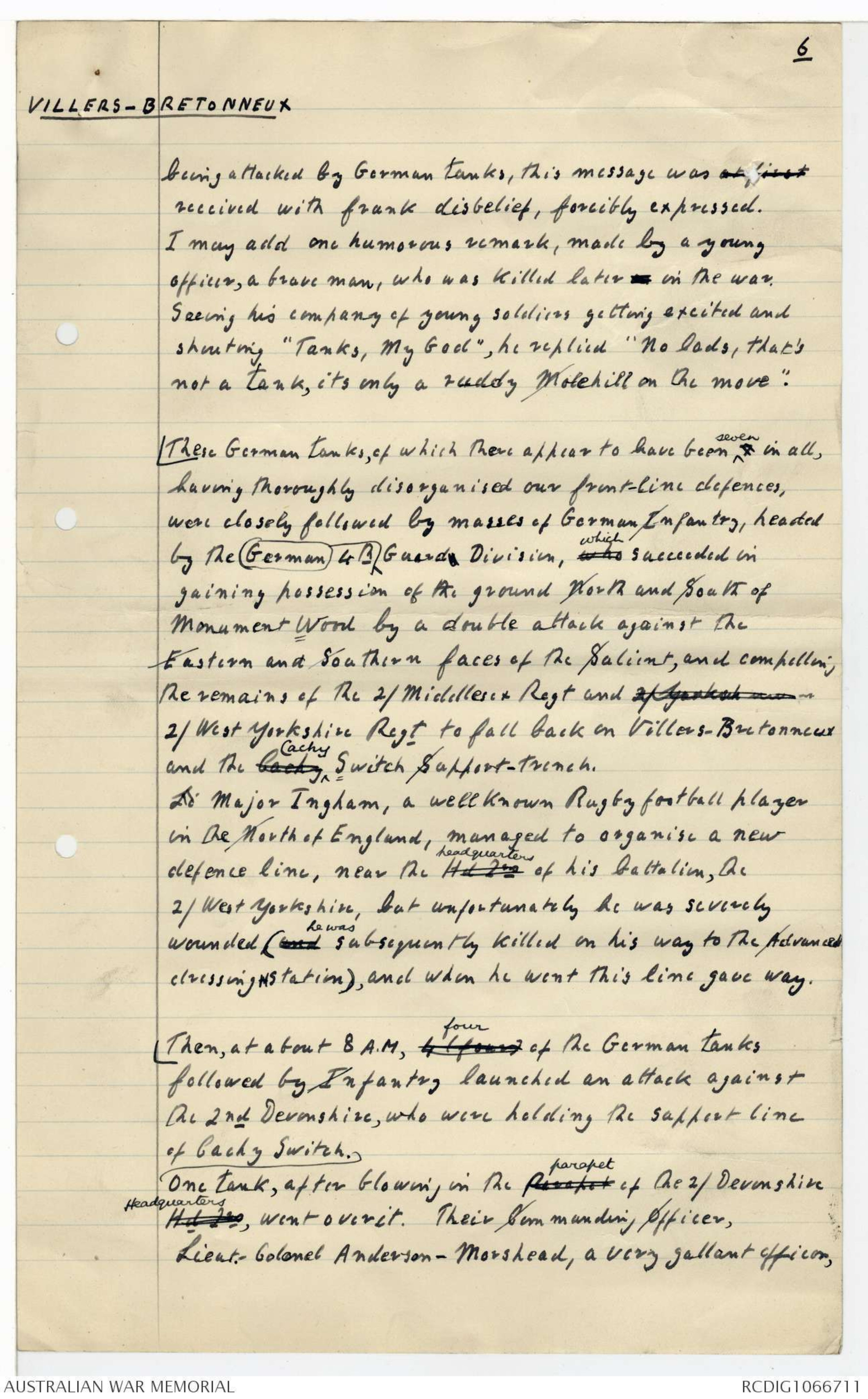
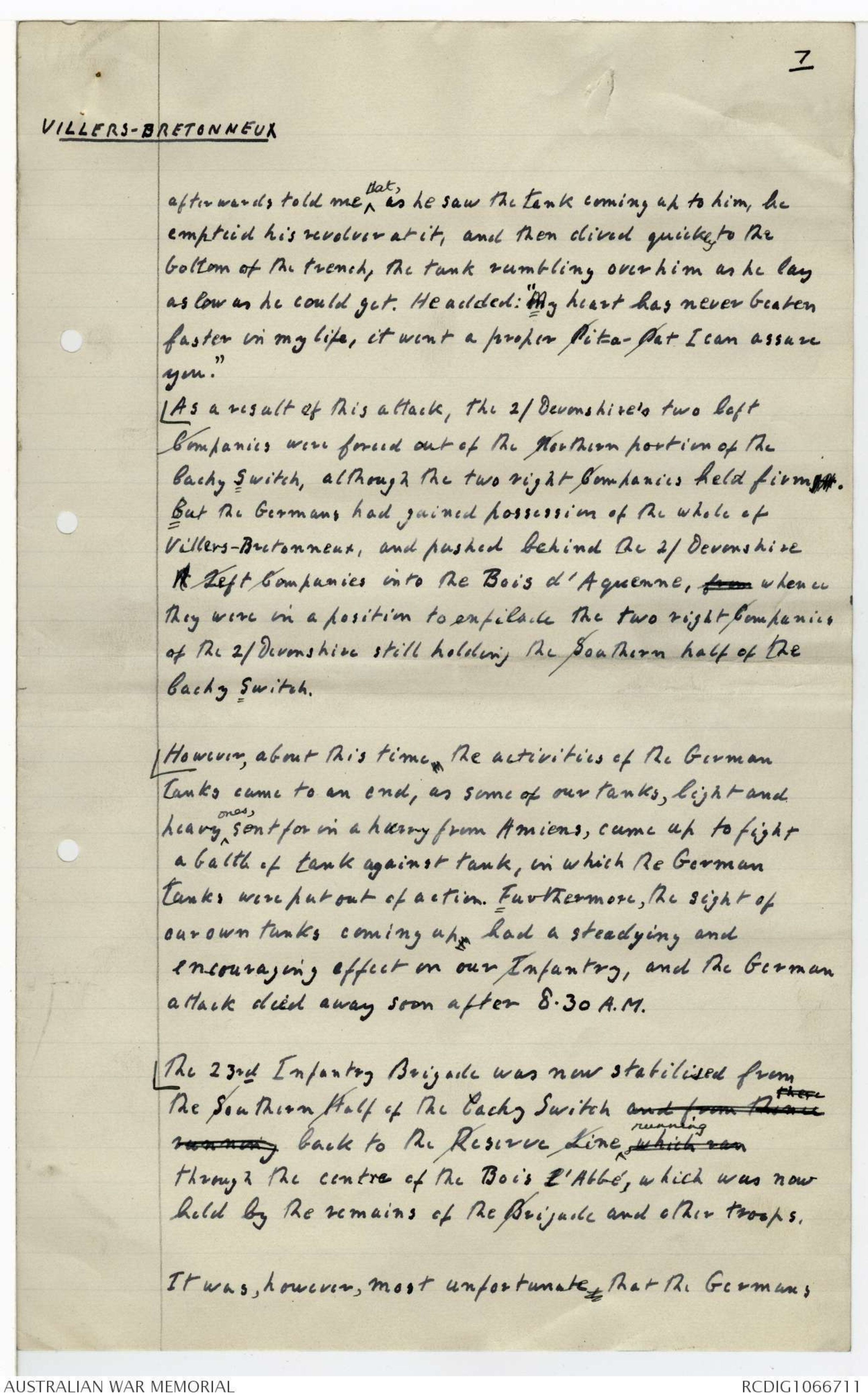
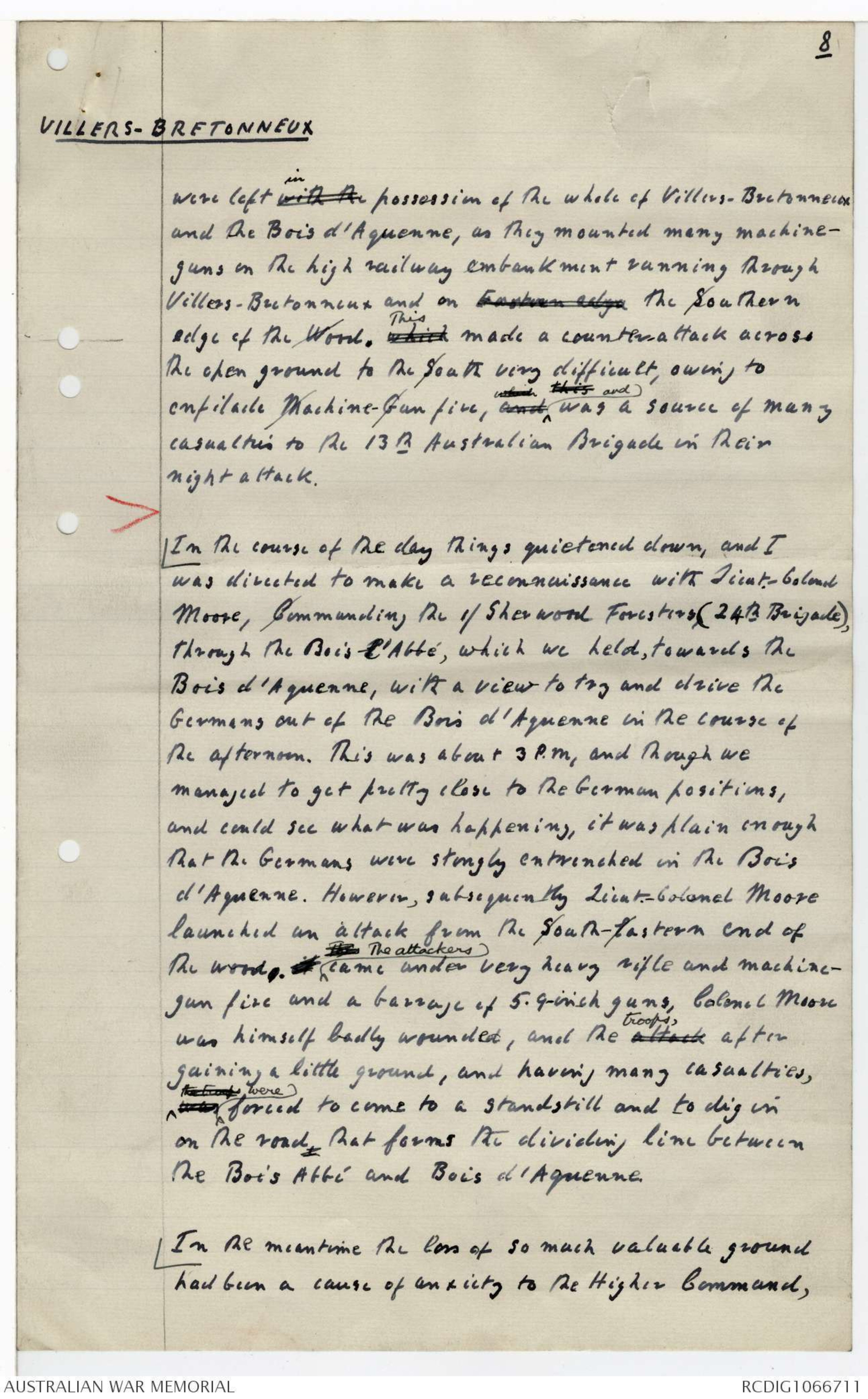
From Rt. Hon. R. Anthony Eden
R.S.S.l.L.
NS.W. BRANCH
15 DEC 1936
RECE1VED
Foreign Office,
S.W.1.
9th November, 1936.
JMC
Dear Sir,
It was indeed good of you to think of sending me
a copy of "Reveille", and I was most interested to
read it.
It is quite true as you say that I was a General
Staff Officer of the 58th Division at Villers-Bretonneux
in April 1918 for a short time before becoming Brigade
Major of a Brigade in the 66th Division. Previous to
my service in the 58th Division I served with my
own Regiment, the King's Royal Rifle Corps.
I am sorry that I haven't got a photo at hand to
send to you in reply to your request, but I can promise
you that the readers of "Reveille" sustain no loss in
consequence!
Perhaps I may without impertinence add that I have
the clearest recollections of the gallantry of
Australian. . . . .
J. Black, Esq.
Australian troops at Villers-Bretonneux at what
must have been one of the most critical phases of
the war.
Believe me,
Yours truly,
Anthony Eden
1
[*Block
panel*]
SILVERDENE,
SUNNINGDALE,
BERKS.
26 April - 1936
[*Panel
Copy
A*]
VILLERS-BRETONNEUX
April 24th, ^xxx, 1918
by Brig.-General G.W. St. G. GROGAN, V.C., C.B., C.M.G., D.S.O. & bar
[*26/P ital.*]
The German attack at Villers-Bretonneux on April 24th, x 1918,
though limited in time and extent, was nevertheless a very violent
one. Had it succeeded, it would have been a disaster for us.
If the Germans had gained permanent possession of Villers-Bretonneux
and the adjacent ridges, which indeed are in this locality the
last high ground to veil Amiens from direct view, then xxx
that great town city and important railway junction would have
been completely uncovered.
Then Amiens, lying as it does at the bottom of the Somme ^river valley
and its tributaries, would have been open to direct bombardment
at a distance of 6 ^six miles only below Villers-Bretonneux, and
in addition the whole of our North and South lines of
communication, which converge Road and Rail, which
converge in a knot in Amiens, could have been hopelessly
cut.
That this impending calamity was arrested at the eleventh hour
is due primarily to the gallantry and leadership of the 5thAustralian Corps 13th and 15th Australian Brigades
The fight at Villers-Bretonneux has therefore a permanent
importance in the Records of the Great War, for -
(a) It was the first and perhaps the only occasion in which
the Germans, in an initial attack employed armoured tanks,
clumsily copied from our own.
(b) It will ever be remembered for perhaps the greatest
individual feat of the War - the successful Counter- attack
by night across unknown and difficult ground, at a few
hours notice, by the Australian Soldier.
[*black type*]
2
VILLERS-BRETONNEUX
Abler pens than mine, have ^described and will again describe, the fight as
a whole. I can only write of it from the narrow point of view
of a Commander of one of the Brigades, the 22nd Infantry Brigade,
exposed to the first fury of the German avalanche.
My Brigade (the 23rd) Infantry Brigade ^- consisting of the
2/Devonshire Regt, the 2/ West Yorkshire Regt, and the
2/ Middlesex Regt ^- had, in the last 10 ten days of March and
beginning of April, been very heavily engaged in defending
the line of the Somme, to hold which we had been hurri
hurriedly summoned with the rest of the 8th Division from
rest billets in the North.
Losses in this continuous battle had been very heavy and, just
before our move up to the Villers-Bretonneux area, these losses
had been made good by heavy drafts from England.
The 2/West Yorkshire Regt had lost over 700 other ranks
and 11 Officers; the 2/ Middlesex about the same; and the
2/Devonshire, who which had not been engaged quite so heavilyengaged on the line of the Somme, rather less. But, in any
case, the casualties of the 3 ^three battalions in the ^23rd Brigade were
not far short of 1,800 men, and officers in proportion.
The drafts which we received to make good the gaps in the ranks
were entirely composed of young boys of from 18 to 19 years
of age, who had received the minimum of necessary ^essential training
in England before being urgently required in France.
Though their gallantry and morale were of high quality, still
they necessarily lacked the stamina and experience of older
and more seasoned troops, and that confidence in themselves
that mutual association and comradeship in the same ranks
of a regiment for long periods must impart ^to all troops, and it was a
severe ordeal for these young troops ^men to be tried so soon soon by the
fierce fire of War in its most intensive and fearsome form.
3
VILLERS-BRETONNEUX
On the 18/19th April, the 8B 8th Division took over from the 5th Australian
Division the defences of Villers-Bretonneux. The front line of
these defences, of which Villers-Bretonneux was the centre,
extended from nearly as far as Vaive Vaire Wood, North of the
Amiens-Foucaucourt road, to a little North of Hangard Wood. x
Vaire Wood and a little to the South wa ^continued to be held by the 5th
Australian Corps Division, and Hangard Wood and a little to the North
^was held by the 18th Division. W The line ^now held by the 8th Division line ran North to South, a little
to the East of the village of Villers-Bretonneux, where
stood Monument Wood.
This line ^just by Monument Wood made a sharp turn to
the West before continuing South again, thus forming
a decided salient at this spot.
Monument Wood was indeed about the highest point in
this vicinity, and was strongly held, but, being a salient,
it made a decidedly weak spot in the defensive line.
(It is interesting to note that it was so called, because the
French had created a Monument there to their fellow
countrymen who had fallen in the latter part of the
Franco-Prussian War of 1870-71 in the fighting round
Amiens, where Gambetta's young levies under Faidherbe
put up a most gallant resistance to the German veterans
under Van der Tann.)
Here it was, upon this salient by the Monument, that
the brunt of the German attack was directed.
Immediately to the West of Villers-Bretonneux were the
two somewhat extensivel woods of Bois d'Aquenne and
Bois l'Abbé, which ran into one another.
They offered a covered way to Villers-Bretonneux and
the front line, but they were never very healthy to stay
in, as the Germans were continually shelling them
4
VILLERS-BRETONNEUX
and filling them up with mustard gas.
However, the Support Line ran just in front of the Bois l'Abbe
Bois d'Aquenne, between it and Villers-Bretonneux,
and was called the "Cachy Switch"; and the Reserve Line
ran through the middle of the Bois L'Abbé, rather farther
to the West.
On the evening of the 23rd April ^23rd my Brigade moved up to take over
our front line just North and South of Monument Wood, in
the Salient already mentioned. The 2/Middlesex were on the left
and 2/West Yorkshire on the right holding the Monument Wood
Salient. The 2/Devonshire were in Support in the Cachy Switch,
immediately behind. Brigade Hd Qrs Headquarters were about 600 to 700
yards farther back, in some shelters constructed in the railway
embankment of the Railway which goes from Amiens to Chaulnes,
and which passes more or less through the centre of Villers-Bretonneux
in doing so.
We had been warned by Divisional Hd Qrs ^headquarters before taking over
that a heavy attack was believed to be imminent next morning,on the 24th but the troops ^- though very young and quite new
to the game, having, as I said before, just come out from home ^-
were in very good spirits. The trenches we took over were
good and all ranks were confident that we would be able
to hold our own.
At 3.30 a.m ^on April 24th the Germans laid down on our front and rear
positions one of the heaviest bombardments I have ever
experienced. The nature of this bombardment may be
inferred from the fact that a Medical Red Cross Officer ^-who was a citizen of the U.S.A. ^and, who was captured early
in the attack by the Germans, and afterwards released -
5
VILLERS-BRETONNEUX
later on informed us that as he went through the German lines
he saw long lines of German Heavy Guns, axle to axle,carrying on the bombardment, which were being fixed
at high pressure by gun-teams stripped to the waist, with
relief teams standing by each gun in order to keep up a
continuous service of the guns.
This Bombardment was preparatory to an attack along the whole Front
by of no less than ^five 5 German Divisions assisted by tanks.
All our troops had already suffered extremely heavy casualties
from this long continued shelling, when at about 6.30 A.M.
the enemy started mixing up a heavy ^dense smoke barrage with
his heavy shells.
Suddenly, at 7 A.M, a number of heavy ^large German tanks appeared
out of the smoke just North and South of Monument Wood.and Despite the storm of rifle and machine-gun fire that
was opened on them, there was no heavy enough metal to
damage or stop them, and they were soon across the 23rd
Infantry Brigade's front-line trenches, enfilading them
with gunfire and lachrymatory Gas, running up and
down them, and otherwise completely disorganising all
our front line.
These tanks, I may say, were heavy ^ponderous clumsy affairs, heavily
gunned and armoured, and were the enemy's first
attempt to copy our own better constructed tanks.
No one had ever thought that there was a possibility of
the Germans employing this weapon, so no provision
had been made to stop them, by the placing forward
of anti-tank guns to knock them out by direct fire.
Indeed, when ^the 23rd Infantry Brigade first reported to
8th Divisional Headquarters that our front line was
6
VILLERS-BRETONNEUX
being attacked by German tanks, this message was at first
received with frank disbelief, forcibly expressed.
I may add one humorous remark, made by a young
officer, a brave man, who was killed later xx in the war.
Seeing his company of young soldiers getting excited and
shouting "Tanks, My God", he replied "No lads, that's
not a tank, its only a ruddy Molehill on the move."
These German tanks, of which there appear to have been ^seven 7 in all,
having thoroughly disorganised our front-line defences,
were closely followed by masses of German Infantry, headed
by the to (German)4B^ Guards Division, who which succeeded in
gaining possession of the ground North and South of
Monument Wood by a double attack against the
Eastern and Southern faces of the Salient, and compelling
the remains of the 2/ Middlesex Regt and 2/Yorksh xxxx
2/ West Yorkshire Regt to fall back on Villers-Bretonneux
and the Cacky ^Cachy Switch Support-trench.
Lt Major Ingham, a well known Rugby football player
in the North of England, managed to organise a new
defence line, near the Hd Qrs headquarters of his battalion, the
2/ West Yorkshire, but unfortunately he was severely
wounded (and he was subsequently killed on his way to the Advanced
dressing N Station), and when he went this line gave way.
Then, at about 8 A.M, 4 (four) four of the German tanks
followed by Infantry launched an attack against
the 2nd Devonshire, who were holding the Support line
of Cachy Switch.
One tank, after blowing in the parapot parapet of the 2/ Devonshire
Hd Qrs Headquarters, went over it. Their Commanding Officer,
Lieut.- Colonel Anderson - Morshead, a very gallant officer,
7
VILLERS-BRETONNEUX
afterwards told me ^that, as he saw the tank coming up to him, he
emptied his revolver at it, and then dived quickly to the
bottom of the trench, the tank rumbling over him as he lay
as low as he could get. He added: "My heart has never beaten
faster in my life, it went a proper Pita-Pat I can assure
you."
As a result of this attack, the 2/ Devonshire's two left
Companies were forced out of the Northern portion of the
Cachy Switch, although the two right Companies held firmxx.
But the Germans had gained possession of the whole of
Villers-Bretonneux, and pushed behind the 2/ DevonshireR Left Companies into the Bois d'Aquenne, from whence
they were in a position to enfilade the two right Companies
of the 2/ Devonshire still holding the Southern half of the
Cachy Switch.
However, about this time the activities of the German
tanks came to an end, as some of our tanks, light and
heavy ^ones, sent for in a hurry from Amiens, came up to fight
a battle of tank against tank, in which the German
tanks were put out of action. Furthermore, the sight of
our own tanks coming up had a steadying and
encouraging effect on our Infantry, and the German
attack died away soon after 8.30 A.M.
The 23rd Infantry Brigade was now stabilised from
the Southern Half of the Cachy Switch and from thence thererunning back to the Reserve Line ^running which ran
through the centre of the Bois L'Abbé, which was now
held by the remains of the Brigade and other troops.
It was, however, most unfortunate that the Germans
8
VILLERS-BRETONNEUX
were left with the in possession of the whole of Villers-Bretonneux
and the Bois d’Aquenne, as they mounted many machine-guns
on the high railway embankment running through
Villers-Bretonneux and on Eastern edge the Southern
edge of the Wood. which This made a counter-attack across
the open ground to the South very difficult, owing to
enfilade Machine-Gun fire, and ^which this and was a source of many
casualties to the 13th Australian Brigade in their
night attack.
[*>*]
In the course of the day things quietened down, and I
was directed to make a reconnaissance with Lieut.-Colonel
Moore, Commanding, the 1/Sherwood Foresters (24th Brigade),
through the Bois L'Abbe, which we held, towards the
Bois d'Aquenne, with a view to try and drive the
Germans out of the Bois d'Aquenne in the course of
the afternoon. This was about 3 P.M, and though we
managed to get pretty close to the German positions,
and could see what was happening, it was plain enough
that the Germans were strongly entrenched in the Bois
d'Aquenne. However, subsequently Lieut.-Colonel Moore
launched an attack from the South-Eastern end of
the woodx. It ^This The attackers came under very heavy rifle and
machine-gun fire and a barrage of 5.9-inch guns, Colonel Moore
was himself badly wounded, and the attack troops, after
gaining a little ground, and having many casualties,
^was ^the troops were forced to come to a standstill and to dig in
on the road that forms the dividing line between
The Bois Abbé and Bois d'Aquenne.
In the meantime the loss of so much valuable ground
had been a cause of anxiety to the Higher Command,
 Not Yet Replaced By AI
Not Yet Replaced By AIThis transcription item is now locked to you for editing. To release the lock either Save your changes or Cancel.
This lock will be automatically released after 60 minutes of inactivity.